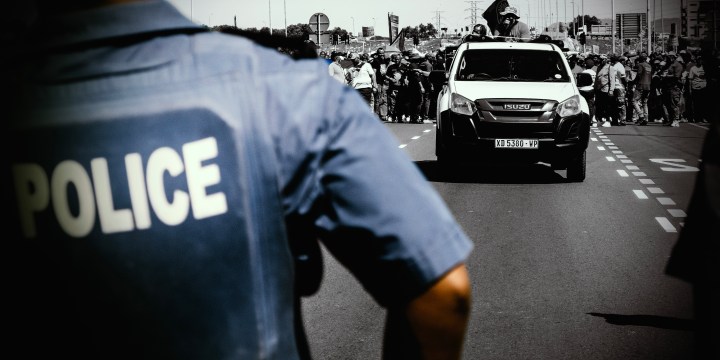GUARDING LIBERTIES OP-ED
Private security and the power to arrest people during protests — what the law says

The Criminal Procedure Act grants civilians the power to effect arrests, and private security personnel are categorised as civilians. However, such actions must strictly adhere to the law to avoid crossing into the realm of kidnapping.
Protests are spiking across the country as political campaigns start mobilising votes for the 2024 general elections. Activists are continuing the fight against complicity in human rights violations, whether perpetrated by public or private institutions. In this context, a grey line has emerged between lawful arrests and what amounts to illegal kidnappings of activists on the ground.
Understanding the difference is crucial for safeguarding individual liberties and upholding the rule of law. The Criminal Procedure Act grants civilians the power to effect arrests. Private security personnel are also categorised as civilians for the purposes of effecting arrests.
However, such actions must strictly adhere to the law to avoid crossing into the realm of kidnapping.
Section 42 of the act outlines the circumstances under which a civilian, including a private security guard, can arrest a person without a warrant. These include apprehending someone who commits or attempts to commit an offence listed in Schedule 1 of the act or when the person reasonably believes the individual has committed an offence and is trying to escape arrest. Additionally, a private person may assist in pursuing a suspect if they believe the pursuer has the authority to make the arrest.
During and after protests, any attempts at civilian arrests of activists’ or protesters’ at houses become void and potentially unlawful kidnappings.
As correctly re-emphasised in the case of Matshete v Minister of Police, “an arrest, being as drastic an invasion of personal liberty as it is, must still be justifiable according to the demands of the Bill of Rights”. It is crucial to note that a civilian arrest must be limited to offences specified in Schedule 1 and not extend to entering people’s houses after protests.
The duties of private security personnel are only valid when there is an imminent offence, and the suspect is fleeing from arrest. Any arrest made without meeting these criteria ventures into the territory of kidnapping, particularly if the offence does not fall under Schedule 1.
During and after protests, any attempts at civilian arrests of activists’ or protesters’ at houses become void and, potentially, unlawful kidnappings. Presiding officers have a crucial role to play in ensuring the legality of arrests. They must be vigilant and actively intervene to ascertain whether a particular person is rightly or wrongly appearing before the court. This vigilance should extend beyond the standard 48-hour detention period to prevent unlawful and unreasonable deprivation of an activist’s right to liberty.
While the issue of who has the authority to effect arrests may not be widely discussed, the lack of discussion does not legitimise potentially unlawful actions. The Bench must remain highly vigilant and proactive in addressing such matters to prevent any complicity in the illegal detention of activists.
Preserving rights
The principle of lawful arrest is fundamental to a just and democratic society. As protests continue to shape the political landscape, it is vital to preserve the rights and freedoms of all citizens. Law enforcement agencies and private security firms must be aware of their limitations and responsibilities, ensuring that arrests are carried out in strict accordance with the law.
Read more in Daily Maverick: The cost of arbitrary SAPS arrests — in human and financial terms — is unacceptably high
As political campaigns and public participation in election campaigns intensify, so too does the need to distinguish between lawful arrests and kidnappings. Civilian arrests, including those made by private security personnel, must adhere to the stipulations of the Criminal Procedure Act, limiting their scope to Schedule 1 offences. Any deviation from this path risks compromising the liberties of activists and protesters and threatens the fabric of democracy.
The duty to uphold the rule of law and safeguard individual rights lies not only with law enforcement, but also with the presiding officers who must act as guardians of justice. Only by adhering to these principles can we strike the delicate balance between ensuring public safety and protecting the values and spirit of the Constitution of South Africa, including the right to freedom of assembly as enshrined in Section 17. DM
Vuyokazi Yokwe is the attorney in the Right2Protest Project, based at the Centre for Applied Legal Studies, Wits University.


















No listing of schedule 1 offences,hastily written article.
The only thing saving SA from total anarchy IS private security, as seen during the 2021 riots…from intel provided, resources and boots on the ground – private security came prepared ..this article is written as if the police force still exists ..
Schedule 1 Offences:
Arson,
Fraud,
Forgery,
Treason,
Sedition
Public violence,
Murder,
Culpable homicide,
Robbery,
Kidnapping,
Child stealing,
Sexual assault, compelled sexual assault or compelled self-sexual assault as contemplated in section 5, 6 or 7 of the Criminal Law (Sexual Offences and Related Matters) Amendment Act, 2007, respectively.
Although the article is 100% correct the issue is that the Private security companies have done a lot on all levels to combat crime. People or the general public look down on these members, and so does the law. It would be great if they were seen as part of the law enforcement and not just Private security personnel.
Am I perhaps correct in saying that private security may only Detain and not Arrest ?
There is a huge difference…